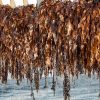In the lush forests of the United States, mushrooms emerge from the earth, revealing a fascinating yet often overlooked kingdom of fungi.
Each step into the woods can reveal a myriad of shapes and colors, from slender, helmet-shaped caps to intricate, brain-like folds.
These fungi, while enchanting, are merely a glimpse into the vast realm of organisms that play crucial roles in our ecosystems.
Fungi, which include mushrooms, are not plants; they are more closely related to animals. Unlike plants, which produce their food through photosynthesis, fungi thrive by decomposing organic material.
According to Amy Honan, a mycology expert at Oregon University, mushrooms “spit out different enzymes” to break down their food externally, absorbing nutrients akin to sipping a smoothie.
This unique feeding process is essential for nutrient cycling in nature.

Scientists estimate that there are around 2.5 million species of fungi, yet only about 150,000 have been formally described.
This limited understanding is concerning given the crucial roles fungi play in supporting terrestrial ecosystems.
Honan emphasizes their importance, stating that without fungi, plants would struggle to exist, ultimately jeopardizing the oxygen we rely on.
Additionally, fungi decompose dead organic matter, recycling carbon and nutrients that sustain various life forms.
As awareness of fungi’s significance grows, discussions are set to take place at the upcoming COP16 UN Convention on Biological Diversity in Colombia.
A joint proposal from Chile and the UK aims to recognize fungi as an independent kingdom of life, which could lead to enhanced conservation efforts.
Mycologist Graham Steinruck notes that documenting fungal diversity not only reveals our planet’s rich biodiversity but also offers insights into sustainable land stewardship.
For many, the adventure of mushroom hunting opens up new perspectives on these intriguing organisms.
Participants like Naomi Ruelle, who traveled from New York for her first organized hunt, express excitement about the diversity of species discovered.
The opportunity to learn about and explore the world of fungi underscores the importance of these often-underappreciated organisms in our ecosystems and beyond.

